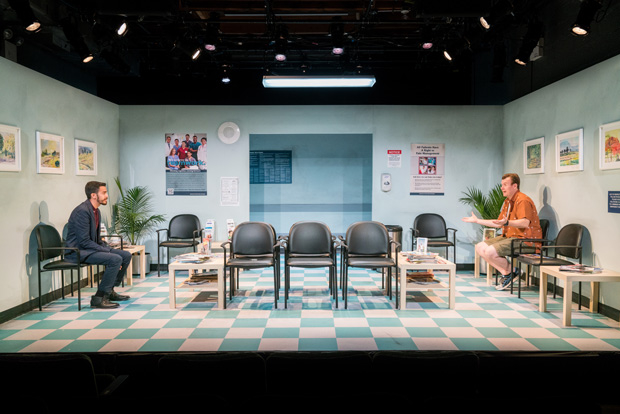In a Little Room

(© Zachary Zirlin Photography)
In a not-so-little room, two men sit, one fidgeting with his phone and the other snoozing. Watercolors, informational posters, and a Purell dispenser adorn the wall. With its rows of black padded chairs and end tables topped by health brochures and stacks of magazines, this hospital waiting area so closely resembles life you could mistake it for the real thing. Regrettably, the attention to detail apparent in In a Little Room's set extends to few other aspects of this black-as-soot comedy by Pete McElligott, now receiving its world premiere at the Wild Project.
The play's action, if you can call it that, begins when a third man enters the waiting room, striking up a conversation with the fidgeter and spilling his coffee on the snoozer. The snoozer, an elderly gentleman who takes several seconds to wake up, hobbles away to clean off, leaving the other two men to philosophize about death. The fidgeter, the audience learns, is Charlie, whose 27-year-old wife died hours ago of two consecutive strokes. His companion is Manning, whose five-year-old daughter just died of a brain tumor. Laughing yet? If not, maybe you will when the spill victim returns and douses Charlie and Manning with his own cup of coffee while they're wrestling on the floor.
What drives Charlie and Manning to blows and torture-tickling in a hospital waiting room is at the core of the play, where grief meets machismo. Both men are grappling with devastating losses that they turn into stakes in a morbid game of one-upmanship. Manning consoles Charlie by implying his wife had it comparatively easy, dying quickly after a "long full life." "Your dead daughter is worse than my dead wife?" Charlie asks, as incredulous as the audience.
They're later joined by an even more bereaved man who's decided to channel his grief by burning the hospital down. He asks Charlie for matches after telling a penis joke. Don't forget, this is a comedy.

(© Zachary Zirlin Photography)
It's a shame that McElligott goes for cheap laughs instead of digging deeper, because there are grains of wisdom in his script. "It’s not just our experiences that make us who we are. It’s our response," says the arsonist. His outlook goes at least as far back as the Stoic philosophers and can be liberating for people saddled with suffering. But the characters' antics and buffoonery (Manning repeatedly refers to the hospital's "fire-retarded" walls) get in the way of the audience taking their ideas seriously.
Thrust between profundity and crassness, the actors try to cope. Jeb Kreager as Manning and David Triacca as the snoozer, the arsonist, and a doctor play the perversity of their characters with assurance. As Charlie, Luis-Daniel Morales can't quite make sense of a man who, in less than an hour, goes from fighting someone in defense of his deceased wife to calling her an "overpowering bitch." Then again, who could?
Also struggling for coherence is Patrick Vassel, the director. On the one hand, he's marshaled a set by Zachary Zirlin and lighting by Katy Atwell that are clinically precise in their realism. On the other, he must manage a collection of characters who verge on absurdity. This disconnect between hyperrealism and nonsensicality is all too apparent in the play's final moments, as flames close in on the waiting room. An orange-and-red glow pulses on the corridor wall, but there's no sound of crackling, no emergency alarm, not even so much as a buzz when the bulbs in the light fixture overhead go out.
In a Little Room leaves the audience, literally and figuratively, in the dark. As viewers grope for meaning, they may recall how Manning described life to Charlie: "billions of people doggy-paddling in the middle of the ocean." This production, though it sheds glimmers of light on how we flounder as human beings, offers no life preservers, let alone passage to shore.










